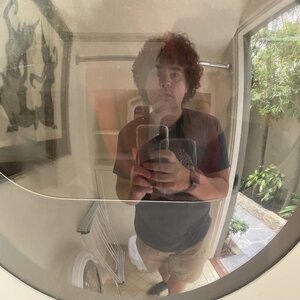Unboxing the Fortress
written by Jeremy Rosenstock
Bahlest Eeble Readings Cycle 13 Fellow
I’ve been thinking about this blog post almost as long as I spent considering what to compose for GLFCAM.
Given the parallel, I should begin by saying that I usually compose for myself. It’s far easier to create a recording if I’m the performer, producer, and composer. It’s difficult to pick instruments knowing that each addition reduces the possibility that it’ll ever be played again. I’m not an optimist when it comes to these sorts of things. I assume the first performance is the last, unless proven otherwise.
Consequently, my approach d/evolves into a feedback loop: I compose for myself, which leads to recording and performing myself, which leads others to believe that I don’t need anyone else to perform or record my music, which leads back to where I began.
I don’t mean to sound maudlin. It’s actually quite liberating to make music for yourself. It’s like when young kids receive a present and play with its box instead of the toy inside. The cardboard may seem dull from the outside, but it has quite a bit of potential. My music is concerned with ignoring the shiny toy and exploring the box itself, finding every pattern and imperfection in its composite materials, tearing it apart and building new shapes and spaces.
Part of me wants to prove that no matter how small a space I am given, I can find as much air to breathe and room to grow as any musician with a fancy, large toy. It’d be nice to write a large ensemble or orchestral piece, but I’m not quite ready. I have yet to accumulate enough small boxes to build a box fortress, each small box containing a single instrument studied separately and scrupulously. At this point, it might be best to abandon this metaphor, as it appears to be on the verge of collapse.*
GLFCAM and Gabriela have given me reason to set aside this mentality, at least temporarily. I was offered a fantastic opportunity to work with incredible musicians over the course of a year, to write a piece that could be read and recorded, interpreted by musicians I am honored to now call collaborators and colleagues. I got to meet student and faculty composers who’ve written music true to their unique sensibilities, composers who comfortably work with large institutions and ensembles. In all, it made me feel more comfortable growing into a bigger space, and for that I am deeply grateful.
That said, I’ll probably go back to my small boxes for a while. It’s all well and good to explore the universe, but there’s work to be done at home.
*Much like a box fortress falls if you add enough boxes, like a game of Jenga, or a house of cards, or a…
Jeremy Rosenstock
Jeremy Rosenstock is a performer-composer based in Los Angeles, California. His principal teachers and mentors include Michael Pisaro, Wolfgang Von Schweinitz, Tim Feeney, Clay Chaplin, Jonathan Dettling, Stan Link, Michael Slayton, Michael Alec Rose, Craig Nies, and Gabriela Lena Frank. His music has been read, recorded, and/or performed by the Isaura Quartet, Nathalie Joachim, Duo Cortona, Lucia Mense, and So Percussion.
Jeremy received his MFA in Music Composition from CalArts and his BM in Piano Performance (with a concentration in composition) from Vanderbilt University’s Blair School of Music. His artistic interests include the integration of natural objects into chamber music, field recording, feedback systems, and just intonation.
He recently participated in International Contemporary Ensemble’s Ensemble Evolution and Westben’s Virtual Performer-Composer Residency, where he co-lead a workshop on “Playing with Objects, Connecting with Place.” His album Abalone and after will be released in the fall of 2021 on People Places Records.
Read More
